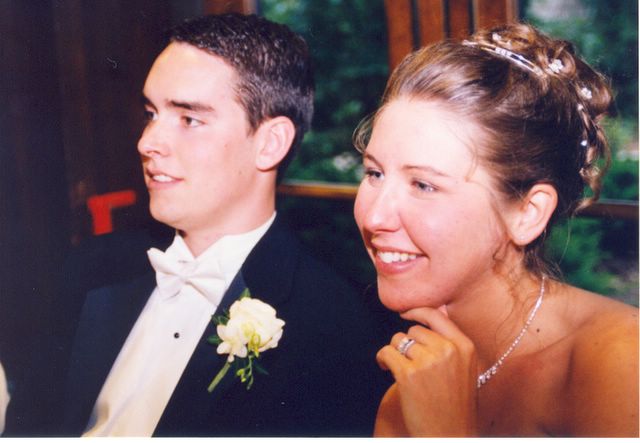Most people give a sporting chance to the idea that you shouldn't pre-judge people based on the small amount of information you know. Even if they don't, they pay lip service to it for the sake of our current cultural climate. Overall, I think this is good, and many people I have met have a certain sense of consistency one way or another-either they give everyone as fair a chance as they are able or they give everyone a once over and come to a conclusion about them that could take years, even decades to seriously challenge. In reality, there is nobody in the first camp, since there is always some process of sizing up another person when you meet them. This occurs before you have any sort of extensive information about the actual individual, since this is often based on past experiences or habits passed on from a previous generation that may or may not be applicable to the current situation.
This unavoidable process of sizing someone up may be the nearest thing humans have to what you might call an animal instinct. It acts a bit like scent does for a dog, although thankfully we don't have to circle up and nuzzle each other's behinds. Certainly this instinctual judgment is helpful in many situations since there are times where you have to act without all the facts, but often this flares in surprising ways. For instance, when walking to the grocery store, I assume that when I pass a hunched old woman wearing a babushka she won't suddenly turn and attack me with a flaming trident: a legitimate fear based on a freaky dream I had after watching
Best of the Best 4 one night, although it seemed to have nothing to do with that movie. Justified or not, I give the old ladies a chance, for one reason simply because if I carried a daikatana around to defend myself I might get arrested, or more likely cut some appendage from my body. Aside from over the top neuroses I still make quick and often unfair judgment calls about people that may or may not be true that invariably prevent a good relationship from developing from the get go.
I think about this in connection to something that happened before Christmas. I was looking for a relatively inexpensive dry cleaner to care for my suit and sport coat, both of which badly needed refreshment. After three years this would be the first time my suit would receive such treatment. I decided that after a wedding last summer, when I spend most of the evening dirty dancing while slightly intoxicated with my friend Bob, it needed some loving care to restore the fabric to a respectable level for a Christmas party. My sport coat was in a similar situation, since I wore it far too frequently and often used it as a second layer while riding my bike to school. It acted like a veritable sponge for bodily secretion and would have made bloodhounds turn up their noses if anyone ever needed my scent to track me through the wilderness. So I looked through the phone book to find a place close to school where I could have my ripe outerwear get a good cleaning.
After an extensive search of approximately two minutes I found a shop close to the Institute. When I gave them a call, what quite possibly was a man answered the phone with a guttural sound. Momentarily phased, I asked how much it would cost to dry clean a sport coat, completely forgetting about the suit since only the coat was within olfactory range. A response that I took to mean eight dollars followed, to which I asked how long it would take. Some muttering, then nothing. I asked again, and almost immediately I heard a shout that was probably “one day,” but I couldn't be sure. After I hung up I felt a bit uneasy about the whole thing, but I felt obligated to patronize this shop since I had extended the digital handshake of a phone call.
As I biked down College St., searching for the address, I felt myself dreadfully propelled past a bevy of slick, professional looking laundry and dry cleaning shops. I maintained the hope that the address was for some kind of professionally managed garment service I had never noticed before. This was unlikely since I have driven the length of this road innumerable times for over a year. But still, I pictured bright, polished linoleum, stainless steel, and the buzz of automation hovering in the air. To me, these things guaranteed rejuvenated clothing that would actually look better than when they were originally purchased. Perhaps even the wear on the elbows, missing button, and frayed cuffs of my sport coat would be miraculously healed by the expert clothing professional, looking not unlike my vision of a domestically oriented Jesus.
When I pulled up to the correct address, I knew this would not be the case. It was a dilapidated building housing an even more dilapidated shop, with a yellowed, partly illuminated sign cleverly announcing to the citizens of Toronto that in here there resided simply a “Cleaner,” unlike the other places I passed that offered, “Expert Cleaning Services,” “Suds and More,” or “Dry-Cleaning with Care.” I couldn't even see through the stained and dirty windows as I locked up, and I wondered how I could trust my precious coat and only suit to a place that couldn't even keep itself fresh and squeaky. As crestfallen as I was at that moment, I looked down the block to just catch a glimpse of the last place I passed that looked so much nicer that his one. I came close to turning back and declaring to this place, “launderer, clean thyself.” But I didn't.
Immediately inside the door was a short flight of stairs leading to the main floor of the shop, which was about three feet above street level. At first, I wondered if my glasses were fogged or had a smudge, since things seemed a bit hazy at eye level from where I was standing. But after I removed my glasses the haze remained, and I wondered if there was some malfunction with a machine that was causing a bit of smoke in the shop. This did not bode well. But when I took another few steps into the shop this fear was dismissed in favor of a new one, for I was overcome by the distinct smell of cigarettes. There was a man at the front counter of the crowded room with one in his mouth and another in an ashtray, both burning away. Since it was a one room business, I saw a small old woman just behind him operating what looked to be a large ironing machine. Beside her was several racks of clothes, all engulfed in a cloud of tobacco. As I was walking up the stairs into the haze, the old woman started shouting in a language I wasn't familiar with. She was pointing to the slacks she was working on, and the old man replied with a guttural noise similar to what I had heard on the phone. He went over and picked up the pants and after he held it inches from his face, since he seemed to have failing eyesight, he started yelling and threw it into a rumpled pile on the floor. The woman shrugged and reached for another pair. As the man came back to the counter I noticed a large sign on the wall, which stated in no uncertain terms that the business would not be responsible for any damage to clothes while in their possession. This did not make me feel good in light of what I had just seen. Where was the shiny metal? Where were the cleaning robots? Where was Jesus? There were just crazy people here; why should I trust them?
But I silently handed my suit and coat to the short, half-blind old man who I assumed was the manager and resident dry cleaning expert. After I stroked them fondly one last time, the man gave me a small sheet of paper scribbled with indecipherable symbols, followed by a verbal injunction that probably meant that these would be done by this time tomorrow. I left with a meager wave.
If I ever saw them again, I was sure both would be irreparably damaged, or at best smell like smoke until they underwent some expensive form of nicotine detox for the addiction my fabric would have developed from its time in the shop. Maybe this guy had it in him to be a good cleaner, but all signs indicated otherwise. I felt like I had placed my trust in someone entirely unsuited to the task, even if they were a nice person. I felt like I had inadvertently placed my faith an armless mountain climber. Now I simply had to wait for the assured failure, tangibly resulting in my ruined clothes. My anticipated loss of possessions caused a number of reactions based on what I knew. I knew that cigarette smoke stinks up clothes, so I pre-blamed these smokers for what I knew would happen. I didn't know what goes into the dry cleaning process, but if they were apparently incompetent in something as simple as properly ironing pants, something I could do, how could they carefully clean my suit, which I couldn't? This amounted to funding gross incompetence. I anticipated a lot of things, none of them good.
A day later I walked to the shop from school, dreading what I would find in return for my fifteen dollars. When I entered, the cloud still encircled the counter, and the man still said nothing when I handed him my ticket. The old woman in the back was gone. He shuffled over to a rack and pulled out two bags, immediately handing them to me. I paid, then scooted out to the street where I could inspect the damage without actually having to confront the keeper about it. To complain about and ridicule him behind his back seemed like a much more civilized approach that actually trying to talk to him. I pulled both articles out under a bright streetlight on the corner and looked for the damage.
Nothing. Nothing but crisp seams and the familiar tight weave of the fabric. All the buttons in place. I smelled them everywhere, searching for the clinging smoke I knew would be there, but could sense nothing. Nothing but clean clothes. No smoke, no body odor, no overpowering chemicals, no ashes. It was a perfect job.
Oddly, there was no immediate relief from all the anxiety I had stored since the beginning of the whole affair. My climber had somehow managed to gnaw his way to the rocky peak, yet I was not relieved. I realized that in my mind I had snowballed this whole event into an uncalled for insult to this man and his business. I had no knowledge of anything involving dry cleaning or this man's business, but accused him of incompetence based on my own expectations, funded by my limits and fears. I expected linoleum, robots, and my own personal Jesus, and was angry when I got a man. This was shameful.
But I was also hopeful. Maybe this whole episode would put some sense in me and show me that people can be surprising no matter how many expectations we place on them. Maybe I was cleansed from a few of the prejudices by this small, half-blind, chain smoking old man. It was a very small even when put into perspective, and really, I only got what I should have expected had I been reasonable. But just maybe this would in a small way change the way I looked at some people.
Then I saw an old lady in a babushka pass by. I tensed up for just a moment and, after nothing happened, scurried back to school.
M
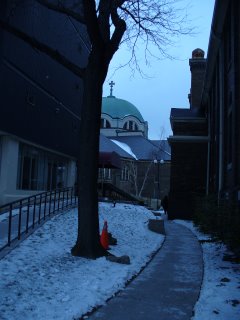 For all of our good friends and devoted readers who spent part of their life reading that last, long post--a break! In typical Yvana fashion, I'll be right to the point with very little flowery language, and focus on the update. With pictures! (To the left is a picture of the last part of our walk to church on Sunday mornings--the week after the snow one we posted about. Of course, straight ahead is our church--in the Byzantine style. On the left side of the picture is Saint Anne's Place, a retirement community, and on the right is an enormous building with a theatre, a fellowship hall, and other rooms that we rent out to drama groups etc.)
For all of our good friends and devoted readers who spent part of their life reading that last, long post--a break! In typical Yvana fashion, I'll be right to the point with very little flowery language, and focus on the update. With pictures! (To the left is a picture of the last part of our walk to church on Sunday mornings--the week after the snow one we posted about. Of course, straight ahead is our church--in the Byzantine style. On the left side of the picture is Saint Anne's Place, a retirement community, and on the right is an enormous building with a theatre, a fellowship hall, and other rooms that we rent out to drama groups etc.)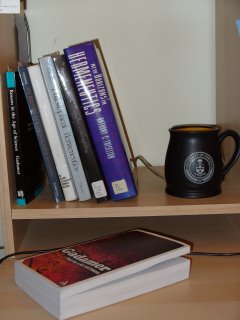 This means, the last few weeks have been pretty intense. Not only are we reading for current courses (and, for Mike, still working on Latin) we are also trying to finish thinking about classes that ended over a month ago. In addition, since one of our courses this last fall was a guided reading which results in our thesis proposal, we also had to be thinking a whole lot about what we were writing for our theses.
This means, the last few weeks have been pretty intense. Not only are we reading for current courses (and, for Mike, still working on Latin) we are also trying to finish thinking about classes that ended over a month ago. In addition, since one of our courses this last fall was a guided reading which results in our thesis proposal, we also had to be thinking a whole lot about what we were writing for our theses.  Anyway, with how orderly Mike is, he works well at a desk, to have all of his books/papers/coffee laid out nicely. I think it is a picture of how his mind works. If this is true, though, what does this picture of my workspace on our bed (right) say about how my mind works? This was taken after 30 hours of nearly un-interuppted time writing and
Anyway, with how orderly Mike is, he works well at a desk, to have all of his books/papers/coffee laid out nicely. I think it is a picture of how his mind works. If this is true, though, what does this picture of my workspace on our bed (right) say about how my mind works? This was taken after 30 hours of nearly un-interuppted time writing and thinking about my thesis. (yes, I did sleep, but I moved the books for that!)
thinking about my thesis. (yes, I did sleep, but I moved the books for that!) We are continuing many traditions, one of which is continuing to attend St. Anne's Anglican Church. It is a short walk from our apartment, and we have been attending there regularly since last October. It is on the list of historical sites in Toronto, which--though you can't see inside, in these shots, is plain enough to see why. If we had a picture of inside, you could see some of the paintings of the group of seven--before they were famous.
We are continuing many traditions, one of which is continuing to attend St. Anne's Anglican Church. It is a short walk from our apartment, and we have been attending there regularly since last October. It is on the list of historical sites in Toronto, which--though you can't see inside, in these shots, is plain enough to see why. If we had a picture of inside, you could see some of the paintings of the group of seven--before they were famous.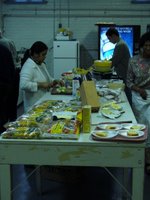
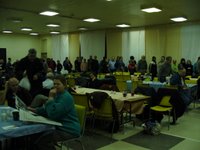 We also help out with their community dinner. The people from the church offer a free, hot meal to needy people in the community once a month. So, last Sunday we were chopping potatoes and cauliflower, making coffee, serving desserts (see Mike at left) and fellowshiping with our fellow parishoners and the people that came in from the cold. We had quite a group this past Sunday!
We also help out with their community dinner. The people from the church offer a free, hot meal to needy people in the community once a month. So, last Sunday we were chopping potatoes and cauliflower, making coffee, serving desserts (see Mike at left) and fellowshiping with our fellow parishoners and the people that came in from the cold. We had quite a group this past Sunday!
 We have also been savouring tea (Thanks again, Paul!) in our favorite mugs--a short and stubby one for Mike (we bought this at a thrift store around the corner for 75 cents, and then we saw it at the University of Toronto for $13CDN!), and a tall and skinny one for me :) (unfortunately this belongs to the apartment, so it won't be ours for too much longer...)
We have also been savouring tea (Thanks again, Paul!) in our favorite mugs--a short and stubby one for Mike (we bought this at a thrift store around the corner for 75 cents, and then we saw it at the University of Toronto for $13CDN!), and a tall and skinny one for me :) (unfortunately this belongs to the apartment, so it won't be ours for too much longer...)